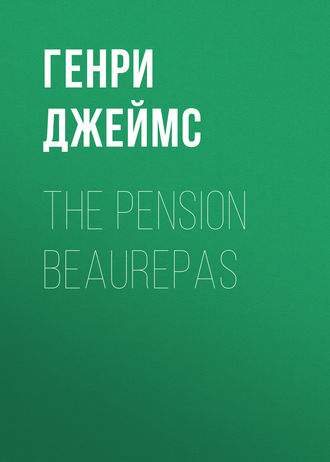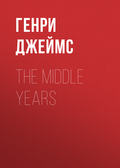
Генри Джеймс
The Pension Beaurepas
I assured myself that our companions were out of earshot, and that Miss Ruck was much occupied with a large vanilla cream. "Because you are always entwined with that young lady. There is no getting near you."
Aurora looked at her friend while the latter devoted herself to her ice. "You wonder why I like her so much, I suppose. So does mamma; elle s'y perd. I don't like her particularly; je n'en suis pas folle. But she gives me information; she tells me about America. Mamma has always tried to prevent my knowing anything about it, and I am all the more curious. And then Miss Ruck is very fresh."
"I may not be so fresh as Miss Ruck," I said, "but in future, when you want information, I recommend you to come to me for it."
"Our friend offers to take me to America; she invites me to go back with her, to stay with her. You couldn't do that, could you?" And the young girl looked at me a moment. "Bon, a false note I can see it by your face; you remind me of a maitre de piano."
"You overdo the character—the poor American girl," I said. "Are you going to stay with that delightful family?"
"I will go and stay with any one that will take me or ask me. It's a real nostalgie. She says that in New York—in Thirty-Seventh Street- -I should have the most lovely time."
"I have no doubt you would enjoy it."
"Absolute liberty to begin with."
"It seems to me you have a certain liberty here," I rejoined.
"Ah, THIS? Oh, I shall pay for this. I shall be punished by mamma, and I shall be lectured by Madame Galopin."
"The wife of the pasteur?"
"His digne epouse. Madame Galopin, for mamma, is the incarnation of European opinion. That's what vexes me with mamma, her thinking so much of people like Madame Galopin. Going to see Madame Galopin— mamma calls that being in European society. European society! I'm so sick of that expression; I have heard it since I was six years old. Who is Madame Galopin—who thinks anything of her here? She is nobody; she is perfectly third-rate. If I like America better than mamma, I also know Europe better."
"But your mother, certainly," I objected, a trifle timidly, for my young lady was excited, and had a charming little passion in her eye- -"your mother has a great many social relations all over the Continent."
"She thinks so, but half the people don't care for us. They are not so good as we, and they know it—I'll do them that justice—and they wonder why we should care for them. When we are polite to them, they think the less of us; there are plenty of people like that. Mamma thinks so much of them simply because they are foreigners. If I could tell you all the dull, stupid, second-rate people I have had to talk to, for no better reason than that they were de leur pays!– Germans, French, Italians, Turks, everything. When I complain, mamma always says that at any rate it's practice in the language. And she makes so much of the English, too; I don't know what that's practice in."
Before I had time to suggest an hypothesis, as regards this latter point, I saw something that made me rise, with a certain solemnity, from my chair. This was nothing less than the neat little figure of Mrs. Church—a perfect model of the femme comme il faut—approaching our table with an impatient step, and followed most unexpectedly in her advance by the pre-eminent form of Mr. Ruck. She had evidently come in quest of her daughter, and if she had commanded this gentleman's attendance, it had been on no softer ground than that of his unenvied paternity to her guilty child's accomplice. My movement had given the alarm, and Aurora Church and M. Pigeonneau got up; Miss Ruck alone did not, in the local phrase, derange herself. Mrs. Church, beneath her modest little bonnet, looked very serious, but not at all fluttered; she came straight to her daughter, who received her with a smile, and then she looked all round at the rest of us, very fixedly and tranquilly, without bowing. I must do both these ladies the justice to mention that neither of them made the least little "scene."
"I have come for you, dearest," said the mother.
"Yes, dear mamma."
"Come for you—come for you," Mrs. Church repeated, looking down at the relics of our little feast. "I was obliged to ask Mr. Ruck's assistance. I was puzzled; I thought a long time."
"Well, Mrs. Church, I was glad to see you puzzled once in your life!" said Mr. Ruck, with friendly jocosity. "But you came pretty straight for all that. I had hard work to keep up with you."
"We will take a cab, Aurora," Mrs. Church went on, without heeding this pleasantry—"a closed one. Come, my daughter."
"Yes, dear mamma." The young girl was blushing, yet she was still smiling; she looked round at us all, and, as her eyes met mine, I thought she was beautiful. "Good-bye," she said to us. "I have had a LOVELY TIME."
"We must not linger," said her mother; "it is five o'clock. We are to dine, you know, with Madame Galopin."
"I had quite forgotten," Aurora declared. "That will be charming."
"Do you want me to assist you to carry her back, ma am?" asked Mr.
Ruck.
Mrs. Church hesitated a moment, with her serene little gaze. "Do you prefer, then, to leave your daughter to finish the evening with these gentlemen?"
Mr. Ruck pushed back his hat and scratched the top of his head.
"Well, I don't know. How would you like that, Sophy?"
"Well, I never!" exclaimed Sophy, as Mrs. Church marched off with her daughter.
CHAPTER VIII
I had half expected that Mrs. Church would make me feel the weight of her disapproval of my own share in that little act of revelry in the English Garden. But she maintained her claim to being a highly reasonable woman—I could not but admire the justice of this pretension—by recognising my irresponsibility. I had taken her daughter as I found her, which was, according to Mrs. Church's view, in a very equivocal position. The natural instinct of a young man, in such a situation, is not to protest but to profit; and it was clear to Mrs. Church that I had had nothing to do with Miss Aurora's appearing in public under the insufficient chaperonage of Miss Ruck. Besides, she liked to converse, and she apparently did me the honour to believe that of all the members of the Pension Beaurepas I had the most cultivated understanding. I found her in the salon a couple of evenings after the incident I have just narrated, and I approached her with a view of making my peace with her, if this should prove necessary. But Mrs. Church was as gracious as I could have desired; she put her marker into her book, and folded her plump little hands on the cover. She made no specific allusion to the English Garden; she embarked, rather, upon those general considerations in which her refined intellect was so much at home.
"Always at your studies, Mrs. Church," I ventured to observe.
"Que voulez-vous? To say studies is to say too much; one doesn't study in the parlour of a boarding-house. But I do what I can; I have always done what I can. That is all I have ever claimed."
"No one can do more, and you seem to have done a great deal."
"Do you know my secret?" she asked, with an air of brightening confidence. And she paused a moment before she imparted her secret— "To care only for the BEST! To do the best, to know the best—to have, to desire, to recognise, only the best. That's what I have always done, in my quiet little way. I have gone through Europe on my devoted little errand, seeking, seeing, heeding, only the best. And it has not been for myself alone; it has been for my daughter. My daughter has had the best. We are not rich, but I can say that."
"She has had you, madam," I rejoined finely.
"Certainly, such as I am, I have been devoted. We have got something everywhere; a little here, a little there. That's the real secret— to get something everywhere; you always can if you are devoted. Sometimes it has been a little music, sometimes a little deeper insight into the history of art; every little counts you know. Sometimes it has been just a glimpse, a view, a lovely landscape, an impression. We have always been on the look-out. Sometimes it has been a valued friendship, a delightful social tie."
"Here comes the 'European society,' the poor daughter's bugbear," I said to myself. "Certainly," I remarked aloud—I admit, rather perversely—"if you have lived a great deal in pensions, you must have got acquainted with lots of people."
Mrs. Church dropped her eyes a moment; and then, with considerable gravity, "I think the European pension system in many respects remarkable, and in some satisfactory. But of the friendships that we have formed, few have been contracted in establishments of this kind."
"I am sorry to hear that!" I said, laughing.
"I don't say it for you, though I might say it for some others. We have been interested in European homes."
"Oh, I see!"
"We have the entree of the old Genevese society I like its tone. I prefer it to that of Mr. Ruck," added Mrs. Church, calmly; "to that of Mrs. Ruck and Miss Ruck—of Miss Ruck especially."
"Ah, the poor Rucks haven't any tone at all," I said "Don't take them more seriously than they take themselves."
"Tell me this," my companion rejoined, "are they fair examples?"
"Examples of what?"
"Of our American tendencies."
"'Tendencies' is a big word, dear lady; tendencies are difficult to calculate. And you shouldn't abuse those good Rucks, who have been very kind to your daughter. They have invited her to go and stay with them in Thirty-Seventh Street."
"Aurora has told me. It might be very serious."
"It might be very droll," I said.
"To me," declared Mrs. Church, "it is simply terrible. I think we shall have to leave the Pension Beaurepas. I shall go back to Madame Chamousset."
"On account of the Rucks?" I asked.
"Pray, why don't they go themselves? I have given them some excellent addresses—written down the very hours of the trains. They were going to Appenzell; I thought it was arranged."
"They talk of Chamouni now," I said; "but they are very helpless and undecided."
"I will give them some Chamouni addresses. Mrs. Ruck will send a chaise a porteurs; I will give her the name of a man who lets them lower than you get them at the hotels. After that they MUST go."
"Well, I doubt," I observed, "whether Mr. Ruck will ever really be seen on the Mer de Glace—in a high hat. He's not like you; he doesn't value his European privileges. He takes no interest. He regrets Wall Street, acutely. As his wife says, he is very restless, but he has no curiosity about Chamouni. So you must not depend too much on the effect of your addresses."
"Is it a frequent type?" asked Mrs. Church, with an air of self- control.
"I am afraid so. Mr. Ruck is a broken-down man of business. He is broken down in health, and I suspect he is broken down in fortune. He has spent his whole life in buying and selling; he knows how to do nothing else. His wife and daughter have spent their lives, not in selling, but in buying; and they, on their side, know how to do nothing else. To get something in a shop that they can put on their backs—that is their one idea; they haven't another in their heads. Of course they spend no end of money, and they do it with an implacable persistence, with a mixture of audacity and of cunning. They do it in his teeth and they do it behind his back; the mother protects the daughter, and the daughter eggs on the mother. Between them they are bleeding him to death."
"Ah, what a picture!" murmured Mrs. Church. "I am afraid they are very-uncultivated."
"I share your fears. They are perfectly ignorant; they have no resources. The vision of fine clothes occupies their whole imagination. They have not an idea—even a worse one—to compete with it. Poor Mr. Ruck, who is extremely good-natured and soft, seems to me a really tragic figure. He is getting bad news every day from home; his business is going to the dogs. He is unable to stop it; he has to stand and watch his fortunes ebb. He has been used to doing things in a big way, and he feels mean, if he makes a fuss about bills. So the ladies keep sending them in."
"But haven't they common sense? Don't they know they are ruining themselves?"
"They don't believe it. The duty of an American husband and father is to keep them going. If he asks them how, that's his own affair. So, by way of not being mean, of being a good American husband and father, poor Ruck stands staring at bankruptcy."
Mrs. Church looked at me a moment, in quickened meditation. "Why, if Aurora were to go to stay with them, she might not even be properly fed!"
"I don't, on the whole, recommend," I said, laughing, "that your daughter should pay a visit to Thirty-Seventh Street."
"Why should I be subjected to such trials—so sadly eprouvee? Why should a daughter of mine like that dreadful girl?"
"DOES she like her?"
"Pray, do you mean," asked my companion, softly, "that Aurora is a hypocrite?"
I hesitated a moment. "A little, since you ask me. I think you have forced her to be."
Mrs. Church answered this possibly presumptuous charge with a tranquil, candid exultation. "I never force my daughter!"
"She is nevertheless in a false position," I rejoined. "She hungers and thirsts to go back to her own country; she wants 'to come' out in New York, which is certainly, socially speaking, the El Dorado of young ladies. She likes any one, for the moment, who will talk to her of that, and serve as a connecting-link with her native shores. Miss Ruck performs this agreeable office."
"Your idea is, then, that if she were to go with Miss Ruck to America she would drop her afterwards."
I complimented Mrs. Church upon her logical mind, but I repudiated this cynical supposition. "I can't imagine her—when it should come to the point—embarking with the famille Ruck. But I wish she might go, nevertheless."
Mrs. Church shook her head serenely, and smiled at my inappropriate zeal. "I trust my poor child may never be guilty of so fatal a mistake. She is completely in error; she is wholly unadapted to the peculiar conditions of American life. It would not please her. She would not sympathise. My daughter's ideal is not the ideal of the class of young women to which Miss Ruck belongs. I fear they are very numerous; they give the tone—they give the tone."
"It is you that are mistaken," I said; "go home for six months and see."
"I have not, unfortunately, the means to make costly experiments. My daughter has had great advantages—rare advantages—and I should be very sorry to believe that au fond she does not appreciate them. One thing is certain: I must remove her from this pernicious influence. We must part company with this deplorable family. If Mr. Ruck and his ladies cannot be induced to go to Chamouni—a journey that no traveller with the smallest self-respect would omit—my daughter and I shall be obliged to retire. We shall go to Dresden."
"To Dresden?"
"The capital of Saxony. I had arranged to go there for the autumn, but it will be simpler to go immediately. There are several works in the gallery with which my daughter has not, I think, sufficiently familiarised herself; it is especially strong in the seventeenth century schools."
As my companion offered me this information I perceived Mr. Ruck come lounging in, with his hands in his pockets, and his elbows making acute angles. He had his usual anomalous appearance of both seeking and avoiding society, and he wandered obliquely toward Mrs. Church, whose last words he had overheard. "The seventeenth century schools," he said, slowly, as if he were weighing some very small object in a very large-pair of scales. "Now, do you suppose they HAD schools at that period?"
Mrs. Church rose with a good deal of precision, making no answer to this incongruous jest. She clasped her large volume to her neat little bosom, and she fixed a gentle, serious eye upon Mr. Ruck.
"I had a letter this morning from Chamouni," she said.
"Well," replied Mr. Ruck, "I suppose you've got friends all over."
"I have friends at Chamouni, but they are leaving. To their great regret." I had got up, too; I listened to this statement, and I wondered. I am almost ashamed to mention the subject of my agitation. I asked myself whether this was a sudden improvisation, consecrated by maternal devotion; but this point has never been elucidated. "They are giving up some charming rooms; perhaps you would like them. I would suggest your telegraphing. The weather is glorious," continued Mrs. Church, "and the highest peaks are now perceived with extraordinary distinctness."
Mr. Ruck listened, as he always listened, respectfully. "Well," he said, "I don't know as I want to go up Mount Blank. That's the principal attraction, isn't it?"
"There are many others. I thought I would offer you an—an exceptional opportunity."
"Well," said Mr. Ruck, "you're right down friendly. But I seem to have more opportunities than I know what to do with. I don't seem able to take hold."
"It only needs a little decision," remarked Mrs. Church, with an air which was an admirable example of this virtue. "I wish you good- night, sir." And she moved noiselessly away.
Mr. Ruck, with his long legs apart, stood staring after her; then he transferred his perfectly quiet eyes to me. "Does she own a hotel over there?" he asked. "Has she got any stock in Mount Blank?"






